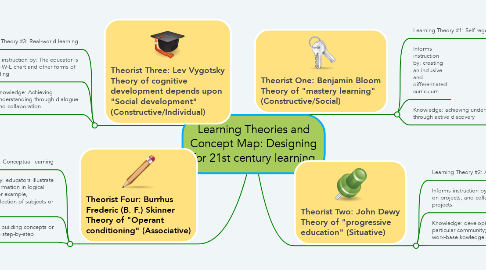Learning Theories and Concept Map: Designing for 21st century learning
by Alethea Wright

1. Theorist Three: Lev Vygotsky Theory of cognitive development depends upon "Social development" (Constructive/Individual)
1.1. Learning Theory #3: Real-world learning
1.2. Informs instruction by: The educator is using K-W-L chart and other forms of scaffolding
1.3. Knowledge: Achieving understanding through dialogue and collaboration
2. Theorist Four: Burrhus Frederic (B. F.) Skinner Theory of "Operant conditioning" (Associative)
2.1. Learning Theory #4: Conceptual learning
2.1.1. mmmmm
2.2. Informs instruction by: educators illustrate how to organize information in logical mental structures. For example, story-mapping or reflection of subjects or topics
2.3. Knowledge: building concepts or competence step-by-step
3. Theorist Two: John Dewy Theory of "progressive education" (Situative)
3.1. Learning Theory #2: Activity learning
3.2. Informs instruction by: implements hands on projects, and collaborative/cooperative projects
3.3. Knowledge: developing practice in a particular community; Also work-base kowledge
4. Theorist One: Benjamin Bloom Theory of "mastery learning" (Constructive/Social)
4.1. Learning Theory #1: Self regulated learning
4.2. Informs instruction by: creating an inclusive and differentiated curriculum
4.3. Knowledge: achieving understanding through active discovery



